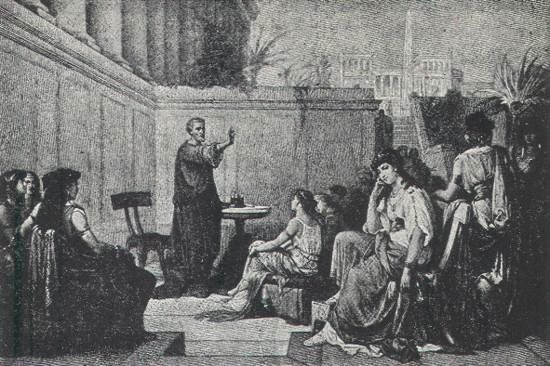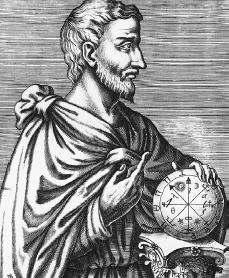 A Scene of the Pythagorean school class. The woman looking back is Theano. [ancient-origin.com]
A Scene of the Pythagorean school class. The woman looking back is Theano. [ancient-origin.com]
Pythagoras, who settled in Croton to escape tyranny, formed the Pythagorean Society under the auspices of Milon, the wise man of Samos. It is said that the group, later commonly referred to as the Pythagorean school, was mysterious and religious.
It was never easy to be a pupil of Pythagoras. To enter the Pythagorean school, the "ability to tolerate what you want to say" was required. He should have kept what he heard through the lecture as his own without revealing it.
Women became members on the same terms as men, and Pythagoras' favorite disciple was none other than Theano, a beautiful maiden, daughter of Milon. They were very different in age, but they loved each other, and eventually got married.
The school has 600 members, including Pythagoras, and consists of 572 men and 28 women. They were a group based on equality, and all property was jointly owned. Even mathematical discoveries and texts were considered shared property. However, they had to be kept strictly confidential about the outside world, but if they leaked the secret, they were thrown alive into the sea.
So how did the lecture at the Pythagorean school go? The classroom was divided into two parts by its unique insignia. He taught his students by differentiating them. Those with Pythagoras can only attend the upper class who passed a certain training course, and beyond the insignia, lower class students could 'listen' to Pythagoras' lecture.
The lower class could not see Pythagoras in person. It is said that it is thoroughly distinguished not only in terms of formality but also in terms of transferring contents of knowledge. Some were able to take class only by ear, while there was a 'group of mathematicians' who received mathematical proofs and texts directly from Pythagorean.
In the class of 'Students who listen only by ear', there was only a teaching done by words, but there was no written text. Pythagoras's choice of education was to be in line with the essence of mathematics itself. Failure to see a teacher creates an auditory relationship that replaces vision.
This situation made students focus more on the words and sounds delivered. In doing so, they trained and refined their hearing and prepared to get closer to harmony. The fact that the story of the Pythagorean school is especially related to musical harmony seems to be related to this.
The Pythagorean school had to abide by strict rules of conduct. It is said that they used mathematics and philosophy research as their moral basis. Pythagoras is known to have first coined the terms philosophy (loves wisdom) and mathematics (learning). A philosopher means a person who tries to discover the secrets of nature.
Today, the word philosophy is composed of philein, which means 'love' in Greek, and sophia, which means wisdom. In general, we translate philosophy as 'love of wisdom', which, as argued by the philosopher Emmanuel Levinas, can also be translated as 'wisdom of love'.
One year while watching the ancient Olympics, Prince Leon of Phyllus asked Pythagoras, "What kind of person do you think you are?" Pythagoras simply replied, "I am a philosopher." When Prince Leon asked Pythagoras to explain what the philosopher was, he said:
"Prince Leon, life is similar to the sports you're watching right now. In the presence of such a large crowd, some are greedy for wealth, and others are in a blind passion for power. Some people look carefully at everything that's happening in front of them and try to understand it. The wisest of these are those who explore the meaning and purpose of life itself. They are searching for hidden secrets of nature. There may not be a perfect wise man, but they are philosophers. They love wisdom, and they value the passion to explore the secrets of nature."
Here, Pythagoras finds out that humans are divided into three categories. The lowest is a merchant who seeks wealth, the middle class is a man who pursues honor, and the highest human being is a humam of thinking, a philosopher. The Greek etymology of the English 'theory' is theoria, it means 'the spectator'.
The Greeks regarded sightseeing, pure mathematics, and nature exploration as noble acts of purifying the soul. This idea led to Plato, who gave the soul three steps. The lowest is desire(appetite), then the spirit, and then the highest is reason.
During the 67th Ancient Olympic Games in 510 BC, riots broke out near the neighboring city of Sybaris, Crotton. The leader of the riots, Telys, overpowered the government, searched for those who supported it, and persecuted them mercilessly. Then many people gathered in Crotton to escape Telys' tyranny. Telis strongly demanded that the citizens of Crotton return the rebels to Shivaris.
 An imaginary Pythagoras portrait [notablebiographies.com]
An imaginary Pythagoras portrait [notablebiographies.com]
But when Milon and Pythagoras rejected his request, Telys mobilized 300,000 troops to attack Croton. Milon bravely confronted Telys's army with 100,000 civilians. Milon, who had outstanding command in the 70-day battle, eventually defeated Telys's army and won.
The war was over, but Croton was also severely damaged. It is said that the city was in chaos again as disagreements over urban reconstruction were rampant. In particular, citizens complained, fearing that the land of Croton City would be owned by the Pythagorean Society. Citizens' complaints are said to have spread even before the war broke out. It's because the Pythagorean Society spent a lot of money monopolizing the new facts they found without informing them of themselves.
There was a citizen named Cylon who had this complaint. He applied to join the Pythagorean school and was rejected, so he hated the Society and was sharpening the blade of revenge. He finally stirred up citizens to attack to Pythagorean Society. Eventually, Ceylon and the civil mob surrounded Milon's house and the Pythagorean school building and set fire to it. Milon miraculously escaped through a hell of a fire, but unfortunately Pythagoras and most of his disciples had a miserable end in the flames.
Due to this incident, ancient Greece lost a great hero in mathematics. However, the spirit of Pythagoras was completely inherited in later generations. He proved that mathematics reject one's personal opinion most thoroughly among all of the fields of study. Because the validity of mathematical theory has nothing to do with personal opinion. It depends entirely on the composition of logic.
This is the most valuable achievement that Pythagoras has contributed to human culture. Pythagoras taught mankind how to find the absolute truth beyond human poor discernment, which is mathematics.
After Pythagoras died, the few surviving members left Croton and hid in other cities or overseas. And then they gathered again to set up a school to spread the mathematics and teach logical proofs. It is said that the contents of the lecture were 'Pythagoras Theorem' and 'Pythagoras Triangle'.
In the 5th century BC, the Pythagoras society was divided into two factions: science and religion. The representative of the scientific sect was Philolaos (4th century BC), who led the late Pythagorean school. Much of what we know about the Pythagorean school is due to the writings of Philolaos, who was born after Pythagoras's death.
From now on, when referring to the Pythagorean school, it is a concept that encompasses not only Pythagoras life but also the late Pythagorean school of Philolaos, who succeeded his ideas after his death.
<Author>